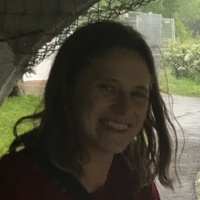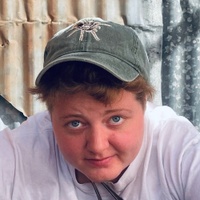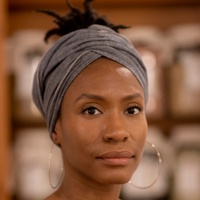As told to Lauren Spear, 1840 words.
Tags: Music, Collaboration, Process, Inspiration.
On giving your ideas time to show what they are
Musician Helena Deland discusses creating with friends, performing in front of strangers, and how she writes a song.Who do you write for?
I don’t know, at this point. I’ve been thinking about that a lot because I recently started playing in front of an audience again after having spent, essentially, two years without having any contact in person with anyone who would be part of that audience. I guess in a way I write for everyone who comes through my mind when I’m in the process of writing.
Was there a point where you wrote just for yourself?
I go in and out of that, and I think it’s the best place to be. When I started collaborating with Ouri (Hildegard), it was amazing to discover what it felt like to write for yourself as part of a unit. We were detached from any idea of an audience or of an end result. What we were making was within our shared middle of the Venn diagram, with no real thought for anything outside of it.
For Hildegard, your project with Ouri, do you write the songs together? How do you find that versus writing alone?
It’s really different. Having both is revitalizing. With Ouri, we bounce off of each other and an idea being chosen is already the result of a consensus. There’s no worry about it being “good” or not, we love it. Whereas when I’m alone, it’s easy to be like, “Is this bad?” [crickets].
I feel like it must be nice to share the load a bit, the wins and the losses.
Absolutely. I love bringing in friends for whatever role is needed.
Do you work with mostly friends?
Yeah, at this point. I’m also open to working with other people, but it feels like there’s so much less work when it’s someone who understands you and who you share a lot more with. Then the project also fits into the larger context of the relationship while being informed by it. Like us as individuals. We are the sum of the people we surround ourselves by.
Why do you make music?
Because I love it. Just music, the fourth dimension of it. It’s also the best thing, to get better at writing songs. It’s such a fricking amazing game, it’s so fun.
I’m feeling anxious about my relationship to making music right now. I think it has to do a lot with coming back from a long tour where I was opening, playing for someone else’s audience. This might explain why I’m also confused about who I make music for. I was in my apartment alone for two years and suddenly traveling every day and playing for tens of thousands of people.
Do you feel touring is sustainable for musicians?
Some people thrive playing live, but I play live because it allows me to live as a musician. Writing is the most rewarding for me. As an introvert, touring can be overwhelming. I do love it and am grateful for it. This last tour I did alone, just me and the other band who I didn’t know prior. It took a while to adjust but once I did, I had a blast. It’s a real privilege to get to know people as you do when you spend all your time together, a string of fifty or so sleepovers.
I feel like you also write about your own life frequently and share a lot of yourself through your music.
Yeah, it’s scary. It’s sometimes hard to feel safe. Having a friend in the audience I think would’ve been helpful. And eventually, I made friends with the people I was touring with. But when you don’t know anyone, you just have to assume people’s warmth.
What do you do as a performer to make yourself feel more grounded when you’re on stage?
One thing that I’ve found really helpful is a meditation that my friend Robin introduced me to. It’s based on grounding yourself by assuming people’s good intentions toward you. In response to my anticipations about performing and having to present myself in front of an audience every night, she told me “If you’re free, I’m free.” It’s a calming thought.
What do you think about when you’re performing?
I think about the communication that’s happening and about all the people who are listening. It’s a privileged place to be. I had some lonely moments on tour but would then find myself in front of five hundred people listening to what I had to say about something I went through five years ago. I felt so lucky. It’s not that people care what I have to say, but music just does that. Music creates a context where you can take what you need from it as a listener.
Where do you begin a song?
Some songs start from a sentence from which I then build an idea, others start with the idea and require going in to find the sentence. Some songs are broken open in a single moment and others have to be toiled over. Last spring, I was rushing home after hanging out in a park with friends because of the COVID curfew, and a few steps away from my house, a sentence with melody came to me and I finished writing it that night. But that’s not always the case.
I feel like my perception of your writing is that you really give a lot of care to the words that you choose and the stories you tell. Knowing you are an avid reader and that you studied literature, how do you feel your actual education of studying the written word has translated into your practice?
A friend recently asked me whether I thought in English or French and I realized I don’t know how to respond to that, nor what language I dream in. I think growing up bilingual shows you how random words are, that they’re just chosen and placed upon objects. That being said, I think what makes experiences feel the most real is when you’ve tried to put them into words, even for yourself, even just in your mind. I’m absolutely fascinated by language and I know that pleasure will never end.
Do you make a choice to sing in English or French when you sit down to write a song?
The people who are contemporary songwriters working right now that I am most personally excited by and involved with in my own personal life are mostly English speakers. I write a lot in dialogue with stuff that I listen to and love so it only makes sense that I would respond in the same language. I think that if I wanted to write in French I would have to submerge myself in French music.
I love the idea of writing in dialogue with your contemporaries. Of listening to those around you and being in an ongoing conversation.
Yes, in all ways, as much in terms of themes as in arrangements. Sometimes you hear something which opens up an idea for you. I feel when I’m in a phase where I’m listening to music I also am feeling most compelled to make it myself.
Do you find that you listen to a lot of new music?
It depends. I don’t listen to music very widely and am sometimes a bit discouraged by streaming platforms. Interfacing with them I find a bit exhausting because of that sense of how unlimited they are.
If you could rework the way music is distributed what would it look like in your ideal world?
I remember my Mom telling me how, as a little kid, she hoped for there to be a portable way to listen to music. I feel grateful for that. I personally don’t miss having objects connected to music. Recorded music is disembodied. What matters is having access. The problem I find with major streaming platforms from a listener’s point of view is it can make you passive. Happy accidents seem to happen less. I like Bandcamp and SoundCloud for that.
But what about in an industry way?
I wish that I didn’t have to put out singles. I wish that albums were revealed as a whole and that your attention hadn’t been pulled in by the songs that are considered most marketable.
You wish it wasn’t curated for you?
I guess that whole hierarchy of single versus songs that compose an album is uncomfortable to me. I totally understand it and it makes a lot of sense, but I remember thinking, “I’ve worked so hard on this album as a whole, here I am giving out scenes of it out of context.” That’s a totally different world though, singles abide to capitalistic demands of marketing yourself and advertising your album as a product.
I also wish there were more women and trans people in all roles of the music industry, that would be sick. I have yet to work in a non-male-owned studio.
The music industry is extremely male-dominated.
It’s harsh. It is an industry that is still very masculine. I think a lot of industries are still extremely masculine, it’s just the reality of this time.
How do you find your own position in that?
It’s fucked up, I find it really intense. When I was writing for Someone New, the thing that really got me excited was the prospect of writing for women or girls actually. I was thinking of the music that impacted me as a high schooler and about the relationship that teenagers have with music in general. It’s beautiful and deep. I was writing about what felt like the resolution of things that stemmed in late adolescence, like my relationship to heterosexual desire and how much I felt like my identity was dependent on what others projected onto me, and I hoped young women would relate. So although I am mostly surrounded by men when I’m on the road and in venues, I know there are people of all identities out there listening.
My last question goes back to something we have spoken about in the past. You once mentioned reading about this poet who would be struck by inspiration in a way that you related to. Can you recount this?
What this poet said was that she would be out working in the field all day and when words from a new poem would come to her, she would have to run home, chasing the poem in order for it not to get away. I relate to this immediacy, but I’ve been learning to sit and wait for inspiration as well. I think randomly crossing paths with an idea is pretty seldom so learning to sit with myself is key.
And waiting?
Yes, wait, and give ideas time to show what they are.
Helena Deland Recommends:
Annie Dillard’s essays
Jonas Fortier’s poetry
Elena Ferrante’s quartet
W.G. Sebald’s novels
Rachel Cusk’s trilogy




